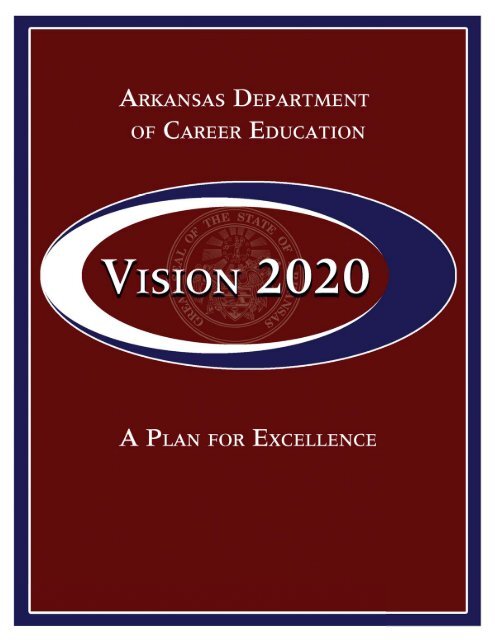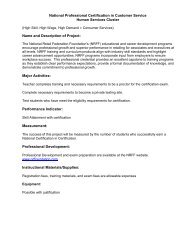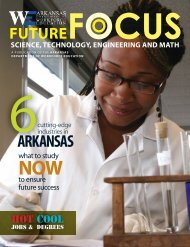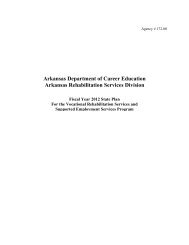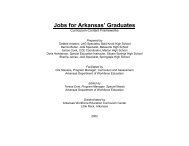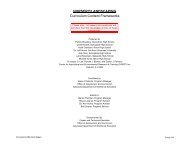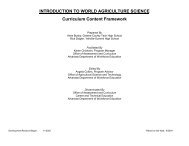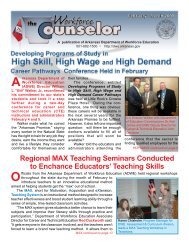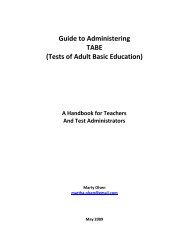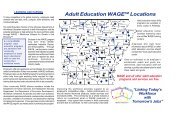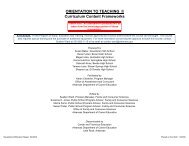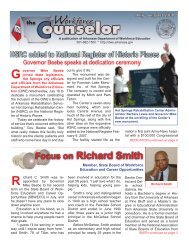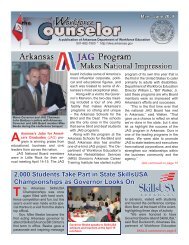VISION 2020 booklet with cover.indd - Arkansas Department of ...
VISION 2020 booklet with cover.indd - Arkansas Department of ...
VISION 2020 booklet with cover.indd - Arkansas Department of ...
You also want an ePaper? Increase the reach of your titles
YUMPU automatically turns print PDFs into web optimized ePapers that Google loves.
The world in which we operate is changing rapidly,<br />
and the implications <strong>of</strong> these changes on education<br />
and training are great.<br />
Today’s knowledge-based economy is transforming<br />
the demands <strong>of</strong> the labor market and placing new demands<br />
on citizens who need more skills and knowledge<br />
to be able to function in their day-to day-lives.<br />
Changing workforce demographics are revolutionizing<br />
long-held tenets about the education and training<br />
needs <strong>of</strong> students and clients. There are fewer<br />
younger workers and many more women, immigrants,<br />
minorities, and older persons in the workforce.<br />
New technologies are changing the ways programs<br />
and services are delivered. From I-Pads in the classroom<br />
to our state-<strong>of</strong>-the-art computerized case management<br />
system, we are using technology to meet<br />
today’s and tomorrow’s challenges—to truly become<br />
“learner-based” and “client-focused.”<br />
In order to ensure that our vision becomes real and to<br />
gauge our progress and successes, we will regularly<br />
monitor our initiatives. We will continue to engage<br />
our many supporters and partners as we work to<br />
achieve our vision.
“Our vision is a work in progress, a<br />
living document that will continue to be<br />
modified as time moves forward and<br />
challenges and opportunities change.”<br />
William L. “Bill” Walker, Jr.<br />
Director, <strong>Arkansas</strong> <strong>Department</strong> <strong>of</strong> Career Education
Career and<br />
Technical Education<br />
I ask every<br />
American to commit to at least one year or more<br />
<strong>of</strong> higher education or career training. This can be<br />
community college or a four-year school; vocational training<br />
or an apprenticeship. But whatever the training may be, every<br />
American will need to get more than a high school diploma.<br />
President Obama<br />
Address to Joint Session <strong>of</strong> Congress<br />
February 24, 2009<br />
The purpose <strong>of</strong> high school is to prepare students for successful lives after graduation.<br />
For all students, this preparation means mastering basic skills, English language arts,<br />
and mathematics. For many students, it means getting ready for further education and<br />
training. For other students, it means gaining the skills for employment. For most students,<br />
it means both.<br />
◘ The number <strong>of</strong> CTE completers is increasing<br />
in every program area. (Completers are students<br />
who complete a minimum <strong>of</strong> three units<br />
<strong>of</strong> credit, including the core required courses,<br />
in a CTE program <strong>of</strong> study and graduate from<br />
high school.) Increases in the number <strong>of</strong> completers<br />
by program area are as follows:<br />
● Agriculture Science and Technology -<br />
40.2 percent<br />
● Arts, A/V and Communications -<br />
44.6 percent<br />
● Business and Marketing Technology -<br />
2.0 percent<br />
● Family and Consumer Sciences -<br />
47.1 percent<br />
● Skilled and Technical Sciences -<br />
39.9 percent<br />
● STEM (Science, Technology,<br />
Engineering, Mathematics) -<br />
4.6 percent<br />
Accomplishments<br />
Our Students Are Achieving Academically
◘ The percentage <strong>of</strong> CTE completers scoring<br />
at the pr<strong>of</strong>icient or advanced level in literacy<br />
has increased by 11.27 percent over the past<br />
fi ve years.<br />
◘ The gap between CTE completers and all <strong>Arkansas</strong><br />
students scoring pr<strong>of</strong>icient in literacy<br />
decreased from 7.47 percent in 2008 to just<br />
2.87 percent in 2011.<br />
◘ The percentage <strong>of</strong> CTE completers scoring at<br />
the pr<strong>of</strong>i cient or advanced level in geometry<br />
has increased by 10.58 percent over the past<br />
fi ve years.<br />
◘ In 2011, the gap between CTE completers<br />
and all <strong>Arkansas</strong> students scoring pr<strong>of</strong>icient in<br />
geometry decreased from 5 percent in 2006 to<br />
no gap at all in 2011.<br />
Accomplishments<br />
Our Students Are Going to College<br />
◘ The number <strong>of</strong> CTE completers going to<br />
college has increased 7.48 percent over the<br />
past fi ve years.<br />
◘ 85.5 percent <strong>of</strong> CTE completers will attend an<br />
<strong>Arkansas</strong> college <strong>with</strong>in six years <strong>of</strong> graduation,<br />
according to a six-year study by the <strong>Arkansas</strong><br />
<strong>Department</strong> <strong>of</strong> Higher Education.<br />
● 13 percent completed a baccalaureate<br />
degree<br />
● 7.6 percent completed an associate degree<br />
● 4.9 percent earned a technical certifi cate <strong>of</strong><br />
pr<strong>of</strong>i ciency<br />
● 16.7 percent were still in college<br />
◘ <strong>Arkansas</strong> <strong>of</strong>fers concurrent credit to ease<br />
the transition from secondary to postsecondary.<br />
Over the past six years, secondary career<br />
center students earned a total <strong>of</strong> 180,274<br />
concurrent credit hours, representing a $14.3<br />
million savings in college tuition costs.<br />
◘ The college-going rate for students in the 21<br />
economically challenged counties served by<br />
the <strong>Arkansas</strong> Works Career Coaches Program<br />
increased by 16.95 percent from fall 2009 to<br />
fall 2011, while the college-going rate for all<br />
<strong>Arkansas</strong> students increased by only 5.3 percent<br />
over the same period.
Accomplishments<br />
Our Students Find Success in Further Education or Employment<br />
◘ The placement rate (postsecondary education<br />
or employment) has been above 94 percent<br />
every year for the past five years except<br />
in 2009-10, when the rate dipped slightly to<br />
93.89 percent.<br />
◘ Many CTE courses prepare students for industry<br />
certification opportunities. Earning an<br />
industry certification demonstrates the pr<strong>of</strong>essional<br />
skill level the student has achieved<br />
and provides industry-recognized pro<strong>of</strong> that<br />
the student is prepared for career-related responsibilities<br />
or postsecondary education or<br />
training. The number <strong>of</strong> CTE completers earning<br />
industry certifications increased from the<br />
2009-10 school year to the 2010-11 school<br />
year as follows:<br />
● Career Readiness Certificates -<br />
51.1 percent<br />
● Business and Marketing Technology -<br />
96.4 percent<br />
● Family and Consumer Sciences -<br />
276.4 percent<br />
● Skilled and Technical Sciences -<br />
248.7 percent<br />
Accomplishments<br />
The New Face <strong>of</strong> CTE<br />
Throughout most <strong>of</strong> the 20th century, “vocational<br />
education” focused on providing narrowly focused,<br />
specifi c job skills for students who were not<br />
considered college material and would go straight<br />
into the workforce. As the global economy and giant<br />
leaps in technology became reality, vocational<br />
education transformed into career and technical<br />
education (CTE).<br />
The change is more than name only. Today,<br />
CTE <strong>of</strong>fers a wide array <strong>of</strong> options for all students,<br />
a seamless transition between secondary<br />
and postsecondary education, and a system<br />
<strong>of</strong> lifelong learning. Today’s CTE students<br />
learn math, science, language arts, and technical<br />
skills, and they also understand how to apply their<br />
learning in real-world contexts.<br />
In 2011, the <strong>Arkansas</strong> Legislature passed Act<br />
743 entitled AN ACT TO ESTABLISH ARKANSAS<br />
COLLEGE AND CAREER READINESS STAN-<br />
DARDS; TO DEVELOP CRITERIA TO EVALUATE,<br />
SUPPORT, PROMOTE, AND FUND ARKANSAS<br />
CAREER AND TECHNICAL EDUCATION PRO-<br />
GRAMS; AND FOR OTHER PURPOSES. The intent<br />
<strong>of</strong> this act was to create the <strong>Arkansas</strong> College<br />
and Career Readiness Planning Program; to lower<br />
educational costs, shorten a student’s time to degree<br />
completion and increase the overall success<br />
rate <strong>of</strong> <strong>Arkansas</strong> students by reducing the need for<br />
remediation; and to ensure that students have the<br />
career-readiness skills to compete in the global<br />
economy.
<strong>Arkansas</strong> participates in several national high<br />
school reform models that integrate academics,<br />
technical skills, and career preparation:<br />
◘ Common Core State Standards and Common<br />
Career Technical Core—<strong>Arkansas</strong> recognizes<br />
the criticality <strong>of</strong> both academic and<br />
career preparation. In 2010, the state adopted<br />
the national Common Core State Standards<br />
(CCSS). The CCSS defines the knowledge<br />
and skills students should have <strong>with</strong>in their<br />
K-12 education so that they will graduate from<br />
high school able to succeed in entry-level,<br />
credit-bearing academic college courses and<br />
in workforce training programs. <strong>Arkansas</strong> is<br />
also in the process <strong>of</strong> adopting the national<br />
Common Career Technical Core (CCTC). The<br />
CCTC is a set <strong>of</strong> high-quality standards defining<br />
what students should know and be able to<br />
do at the end <strong>of</strong> a CTE program <strong>of</strong> study <strong>with</strong>in<br />
a particular career field.<br />
◘ Project Lead the Way—The national Project<br />
Lead the Way (PLTW) program is being<br />
expanded in <strong>Arkansas</strong> as part <strong>of</strong> the STEM<br />
Works initiative. PLTW programs are designed<br />
to engage, encourage, and educate students<br />
<strong>of</strong> diverse backgrounds, helping them all to become<br />
college- and career-ready. Students develop<br />
critical thinking skills through hands-on<br />
project-based learning that prepares them to<br />
take on real-world challenges. The three main<br />
PLTW programs are Gateway to Technology,<br />
Pathway to Engineering, and Biomedical Sciences.<br />
◘ High Schools That Work/Technology Centers<br />
That Work—<strong>Arkansas</strong> participates in the<br />
Southern Regional Education Board’s (SREB)<br />
High Schools That Work, the nation’s largest<br />
school improvement initiative for high school<br />
leaders and teachers. <strong>Arkansas</strong> also participates<br />
in Technology Centers That Work, the<br />
SREB’s school improvement initiative designed<br />
to help secondary technical centers<br />
review and implement the actions needed to<br />
produce high-demand, high-wage graduates.<br />
◘ Career Academies—The career academies<br />
operate as small schools-<strong>with</strong>in-schools and<br />
are focused around career themes such as<br />
medical pr<strong>of</strong>essions, information technology,<br />
or law and public safety. Career academies<br />
integrate technical knowledge <strong>with</strong> core academics<br />
that qualify students for admission to<br />
four-year colleges or universities.<br />
Governor Mike Beebe and the Governor’s Workforce<br />
Cabinet have promoted several initiatives<br />
to enhance the technical and academic skills <strong>of</strong><br />
students and adults, as well as to assist them in<br />
making informed career decisions:<br />
◘ <strong>Arkansas</strong> Works—Established in fall 2009 as<br />
an initiative <strong>of</strong> Governor Mike Beebe and the<br />
Workforce Cabinet, the <strong>Arkansas</strong> Works program<br />
is a strategic initiative to coordinate education,<br />
training, and economic development in<br />
<strong>Arkansas</strong> communities. <strong>Arkansas</strong> Works has<br />
three components: the <strong>Arkansas</strong> College and<br />
Career Planning System, a web-based career<br />
planning tool powered by Kuder; the College<br />
and Career Coaches Program that serves 21<br />
<strong>of</strong> <strong>Arkansas</strong>’s most economically challenged<br />
counties and three Little Rock high schools;<br />
and the ACT Academy, designed to increase<br />
ACT scores, reduce remediation, and improve<br />
the effectiveness <strong>of</strong> college and career information<br />
given to students and their families.<br />
◘ STEM Works—This initiative focuses on Science,<br />
Technology, Engineering, and Math<br />
(STEM) education in high schools and universities,<br />
so that the state’s workforce will be able<br />
to meet the escalating demand for employees<br />
in high-tech fields. STEM Works specifically<br />
seeks to overhaul the ways in which <strong>Arkansas</strong><br />
high school students receive STEM education<br />
and to increase the number <strong>of</strong> well-qualified<br />
STEM teachers.<br />
◘ <strong>Arkansas</strong> Career Readiness Certificate<br />
Program—<strong>Arkansas</strong> is one <strong>of</strong> 49 states <strong>with</strong> a<br />
Career Readiness Certificate (CRC) program,<br />
which is based upon the KeyTrain® curriculum<br />
developed by ACT® Inc., the originator <strong>of</strong><br />
the college entrance examination. The CRC<br />
confirms to employers that a job-seeker possesses<br />
the basic workplace skills required for<br />
21st-century jobs. Many <strong>of</strong> the state’s high<br />
schools are implementing the KeyTrain curriculum,<br />
which will allow high school students<br />
to graduate <strong>with</strong> CRC certification.
◘ Micros<strong>of</strong>t IT Academy— Piloted in the 2012-<br />
13 school year, the Micros<strong>of</strong>t IT Academy provides<br />
web-based instruction and opportunities<br />
to earn industry-recognized certifications, including<br />
Micros<strong>of</strong>t Office Specialist, Micros<strong>of</strong>t<br />
Technology Associate, or Micros<strong>of</strong>t Certifi ed<br />
Pr<strong>of</strong>essional. Topics range from computer<br />
basics to high-level programming, along <strong>with</strong><br />
information and communications technology<br />
management. All public high schools and<br />
adult education centers will eventually <strong>of</strong>fer<br />
the program. <strong>Arkansas</strong> is the fi rst state in<br />
the nation to <strong>of</strong>fer the Micros<strong>of</strong>t IT Academy<br />
to adult learners, who can access services at<br />
adult education centers and <strong>Arkansas</strong> Workforce<br />
Centers.<br />
Career guidance has been dramatically enhanced.<br />
All students now have access to quality career<br />
information resources. Adults also have access to<br />
career information and planning resources.<br />
◘ Career Development Facilitators—Career<br />
development facilitators (CDFs) are specially<br />
trained to work <strong>with</strong> students or dislocated<br />
workers to assist <strong>with</strong> vocational and educational<br />
planning, assessments, and workforce<br />
preparation from middle school through postsecondary<br />
education and the adult workforce.<br />
<strong>Arkansas</strong> has made a priority <strong>of</strong> training<br />
CDFs, <strong>with</strong> more than 400 CDFs now located<br />
throughout the state in high schools, adult<br />
education centers, and <strong>Arkansas</strong> Workforce<br />
Centers.<br />
◘ <strong>Arkansas</strong> College and Career Planning<br />
System, powered by Kuder®—This webbased<br />
resource is provided to all Arkansans<br />
free <strong>of</strong> charge. Through the use <strong>of</strong> the system’s<br />
research-based assessments, individuals<br />
can explore their interests, skills, and work<br />
values. This resource also helps them create<br />
educational plans, build a lifelong electronic<br />
portfolio, explore postsecondary opportunities,<br />
apply for fi nancial aid, and search for<br />
jobs locally and across the state—all from a<br />
single website.<br />
◘ Jobs for <strong>Arkansas</strong>’s Graduates (JAG)—The<br />
state affi liate <strong>of</strong> the national JAG program, <strong>Arkansas</strong>’s<br />
JAG program has become a leader<br />
in implementing the national JAG model. JAG<br />
provides a variety <strong>of</strong> support services to atrisk<br />
youth designed to encourage them to stay<br />
in school through graduation, pursue postsecondary<br />
education, and secure quality entry-level<br />
jobs leading to career advancement<br />
opportunities. <strong>Arkansas</strong>’s JAG program has<br />
received three grants to enhance services,
including a $250,000 grant from the Verizon<br />
Foundation, a $425,000 Temporary Assistance<br />
for Needy Families (TANF) grant, and a<br />
$40,000 grant from the Delta Regional Authority.<br />
◘ Through the registered apprenticeship program,<br />
apprentices learn occupational skills<br />
not only in the classroom but also through<br />
hands-on, paid, on-the-job training. The cre-<br />
dential earned by an apprentice is a portable<br />
and is recognized by industry. An innovative<br />
new program directed through the <strong>Arkansas</strong><br />
Apprenticeship Coalition is the development<br />
<strong>of</strong> training to meet the needs <strong>of</strong> industries as<br />
they implement green technology practices.<br />
<strong>Arkansas</strong>’s youth apprenticeship program<br />
provides high school students an introduction<br />
to work-based learning and industry-defi ned<br />
employability and occupational skills.<br />
Career and Technical Education: Pillars <strong>of</strong> Transformation<br />
The vision for the Career and Technical Education Division (CTE) <strong>of</strong> the <strong>Arkansas</strong><br />
<strong>Department</strong> <strong>of</strong> Career Education through 2015 is to modernize college- and careerreadiness<br />
programs through innovation, collaboration, alignment, and accountability to<br />
provide students technical skill development and guidance toward career opportunities.<br />
The CTE Division has established four Pillars <strong>of</strong> Transformation upon which each department will establish<br />
challenging but attainable goals <strong>with</strong> objectives (tasks) and performance indicators to support<br />
the ACE vision.
Pillar 1—Improve the Image<br />
Goal: By 2015, the Career and Technical Education (CTE) Division will recruit<br />
students into CTE programs <strong>of</strong> study by emphasizing how programs<br />
align <strong>with</strong> college and career opportunities. Increasing student participation<br />
in relevant and rigorous programs <strong>of</strong> study will increase the<br />
number <strong>of</strong> CTE completers from 11,000 to 12,500.<br />
Goal: By 2015, the Career and Technical Education<br />
(CTE) Division will create an atmosphere <strong>of</strong> pr<strong>of</strong>essional<br />
leadership by developing strategies and best<br />
practices that communicate effectively and demonstrate<br />
a consistent message to all staff, school system<br />
personnel, and the public.<br />
Pillar 2—Improve and Support Program Development<br />
Goal: By 2015, the Career and Technical Education<br />
(CTE) Division will implement new practices<br />
and models to increase the emphasis on<br />
innovation by increasing the number <strong>of</strong> highskill,<br />
high-wage, high-demand pathways<br />
and reducing low-performing pathways, which<br />
will lead to increased family-sustaining wage<br />
employment as measured by data provided by<br />
the <strong>Arkansas</strong> Research Center. The number<br />
<strong>of</strong> high-demand pathways will be increased by<br />
10 percent per year, and the number <strong>of</strong> low-demand<br />
pathways will be reduced by 5 percent<br />
per year, thereby increasing opportunities for<br />
students to achieve positive placement after<br />
graduation.<br />
Goal: By 2015, the Career and Technical Education<br />
(CTE) Division will support systemic<br />
reforms to increase the number <strong>of</strong> high-skill,<br />
high-wage, high-demand pathways through<br />
the creation <strong>of</strong> secondary technical centers<br />
accessible to every high school student in<br />
<strong>Arkansas</strong>.<br />
Goal: By 2015, the Career and Technical Education<br />
(CTE) Division will develop mechanisms<br />
to select and fund high-quality career pathways<br />
responsive to regional labor-market<br />
needs. Performance will be measured by<br />
increased business and education partnerships<br />
and industry certifi cations. Results will<br />
be measured by increases in job placement<br />
rates, postsecondary enrollment, and certificates<br />
and/or degrees.<br />
Goal: By 2015, the Career and Technical Education<br />
(CTE) Division will facilitate collaboration<br />
by developing a statewide business and<br />
industry advisory council <strong>with</strong> representatives<br />
from identified career pathways. Outcomes<br />
include collaboration on training needs,<br />
recommendations for technology-based programs<br />
in high-demand sectors, and training<br />
partnerships.<br />
Goal: By 2015, the Career and Technical Education<br />
(CTE) Division will promote the Certified<br />
Career Ready Communities Initiative at the<br />
secondary level by <strong>of</strong>fering school districts<br />
and secondary technical centers incentives<br />
and support to become college- and<br />
career-ready schools as defined in the initiative.
Pillar 3—Improve College and Career Readiness<br />
Goal: By 2015, the Career and Technical Education<br />
(CTE) Division will ensure accountability<br />
for improving college-ready outcomes<br />
through the integration <strong>of</strong> the Common<br />
Core State Standards. Improvements will be<br />
documented by the following:<br />
◘ ACT composite scores will increase<br />
from 20.3 to 20.6.<br />
◘ High school benchmark literacy scores<br />
<strong>of</strong> CTE completers will meet the state<br />
average. The benchmark scores <strong>of</strong><br />
completers are currently 2.87 percent<br />
below the state average.<br />
Goal: By 2015, the Career and Technical Education<br />
(CTE) Division will improve career guidance,<br />
planning, and development strategies<br />
to increase retention, completion, and<br />
pr<strong>of</strong>iciency in career pathways. The CTE<br />
Division will provide incentives to school districts<br />
to meet state goals for completion and<br />
skill attainment. Success will be measured<br />
by improvements in student postsecondary<br />
placement, pathway completion, pr<strong>of</strong>i ciency,<br />
and concurrent or articulated credit.<br />
Goal: By 2015, The Career and Technical Education<br />
(CTE) Division will provide consistent<br />
and continual guidance, planning, and<br />
alignment between high-quality CTE pathways<br />
and labor-market needs to equip and<br />
prepare students for postsecondary education<br />
and training for in-demand occupations in highgrowth<br />
industry sectors. Positive placement in<br />
higher-paying occupations will be determined<br />
by tracking CTE completers who have earned<br />
a Career Readiness Certifi cate (CRC). Data<br />
from the <strong>Arkansas</strong> Research Center will be<br />
used to track completers<br />
Goal: By 2015, the Career and Technical Education<br />
(CTE) Division will promote the development<br />
<strong>of</strong> quality work-based learning opportunities<br />
for high-school students across the<br />
state through the involvement <strong>of</strong> a state business<br />
and industry advisory council and local<br />
councils.<br />
Goal: By 2015, the Career Technical Education<br />
(CTE) Division will expand the College and<br />
Career Coaches Program beyond the currently<br />
served 21 counties and three Little<br />
Rock high schools in order to ensure that<br />
every middle- and high-school student, beginning<br />
in grade 7, has access to a college and<br />
career coach. The number <strong>of</strong> college and career<br />
coaches will increase by 33 percent each<br />
year. Results will be measured by increased<br />
student participation in college and career preparatory<br />
activities, pursuit <strong>of</strong> college and career<br />
opportunities, and placements that align<br />
<strong>with</strong> the student’s skills, abilities, and interests.<br />
Goal: By 2015, the Career and Technical Education<br />
(CTE) Division will form a committee <strong>of</strong><br />
stakeholders to establish guidelines for<br />
implementation <strong>of</strong> ACT 743 <strong>of</strong> 2011 <strong>with</strong><br />
the goal <strong>of</strong> securing additional funding to support<br />
college- and career-readiness activities in<br />
K-12.
Pillar 4—Improve CTE Instruction<br />
Goal: By 2015, the Career and Technical Education<br />
(CTE) Division will boost the rigor and<br />
relevance <strong>of</strong> curricula through the integration<br />
<strong>of</strong> academic and CTE skills <strong>with</strong>in all articulated<br />
postsecondary education pathways.<br />
Outcomes include collaboration <strong>of</strong> training<br />
needs, recommendations for technologybased<br />
programs in high-demand sectors, and<br />
training partnerships.<br />
Goal: By 2015, the Career and Technical Education<br />
(CTE) Division frameworks will be<br />
aligned to the Common Core State Standards,<br />
the Common Career Technical Core,<br />
and industry standards.<br />
Goal: By 2015, the Career and Technical Education<br />
(CTE) Division will review all requirements<br />
for permits and endorsements to<br />
determine if the licensing requirements are<br />
refl ective <strong>of</strong> content knowledge, education credentials,<br />
and work experience if applicable to<br />
ensure that CTE teachers are adequately prepared.
Adult Education<br />
Higher levels <strong>of</strong> skill and education are<br />
important not only for gaining access to better jobs,<br />
but also for negotiating our bureaucratic society and<br />
its complex legal, health care, and retirement systems,<br />
and for accessing and comprehending the seemingly<br />
limitless amount <strong>of</strong> information that comes our way.<br />
- Educational Testing Service<br />
America’s Perfect Storm: Three Forces Changing our Nation’s Future<br />
Adult Education:<br />
Where We’ve Been<br />
Adult education has a long history <strong>of</strong> assisting adults in improving their basic academic<br />
skills, achieving their educational goals, and transitioning to further education or<br />
employment. Instruction is learner-centered and addresses the needs <strong>of</strong> adults<br />
functioning at the lowest levels <strong>of</strong> basic and English language skills to advanced levels<br />
<strong>of</strong> learning and the attainment <strong>of</strong> a high school credential.<br />
◘<br />
◘<br />
◘<br />
Accomplishments<br />
<strong>Arkansas</strong> Adults Are Achieving.<br />
Over the past five years, more than three-quarters <strong>of</strong><br />
all enrolled students taking both the pretest and the<br />
posttest advanced more than two grade levels.<br />
The pass rate on the GED® test is consistently higher<br />
than the national average. While the national pass<br />
rate hovers around 72 to 73 percent, <strong>Arkansas</strong>’s pass<br />
rate averages 85 percent. The keys to <strong>Arkansas</strong>’s<br />
consistent pass rate above the national average are<br />
the requirements that all adults pass the <strong>of</strong>ficial practice<br />
test, well-trained examiners who provide an environment<br />
conducive to testing, and quality instruction<br />
provided by adult education programs.<br />
The number <strong>of</strong> Arkansans earning certificates through<br />
the Workforce Alliance for Growth in the Economy<br />
(WAGE®) program increased 43.7 percent over the<br />
past four years. WAGE provides academic and workplace<br />
skills to unemployed and underemployed adults<br />
to prepare them for entry-level jobs.<br />
◘<br />
◘<br />
◘<br />
Individuals earning WAGE certificates saw their annual<br />
wages increase an average <strong>of</strong> 17.8 percent<br />
over what they had earned before receiving a WAGE<br />
certificate.<br />
From 16 to 18 percent <strong>of</strong> students who were unemployed<br />
before entering adult education and literacy<br />
programs obtained jobs <strong>with</strong>in the first three months<br />
after exiting those programs.<br />
The Commission on Adult Basic Education (COABE)<br />
named Martha Cortes <strong>of</strong> Rogers as the Adult Learner<br />
<strong>of</strong> the Year for 2009. This national award is presented<br />
to a student who has overcome difficult circumstances<br />
to pursue adult learning, who has supported<br />
other adult learners, and who has managed significant<br />
adult responsibilities such as those related to<br />
employment, family, or community.
“Success is not final, failure is<br />
not fatal: it is the courage to<br />
continue that counts.”<br />
~ Winston Churchill<br />
Who Is Enrolled in Adult Education?<br />
Who Is Enrolled in Adult Education?<br />
◘ Over 80 percent are between 19 and<br />
59, the prime working years.<br />
◘<br />
◘<br />
20 percent are preparing for the GED®<br />
test.<br />
15 to 16 percent are learning English<br />
as a Second Language (ESL).<br />
◘<br />
◘<br />
40 to 45 percent function between the<br />
4th- and 8th-grade levels.<br />
20 to 25 percent function between the<br />
9th- and 12th-grade levels.<br />
Greater Expectations<br />
By 2018, 63 percent <strong>of</strong> all jobs will require postsecondary education. However, in<br />
2010, only 56 percent <strong>of</strong> adults had at least some postsecondary education. The nation’s ability to meet<br />
the demand for a more highly skilled workforce depends in part upon increasing the educational levels<br />
<strong>of</strong> adults already in the workforce. At the same time that the number <strong>of</strong> jobs for workers <strong>with</strong> a high<br />
school credential or less is shrinking, the wage gap between workers <strong>with</strong> only a high school credential<br />
or less and workers <strong>with</strong> at least some postsecondary education is increasing. The need is especially<br />
critical in <strong>Arkansas</strong>, where 44 percent <strong>of</strong> working-age adults have only a high school credential or less.<br />
As a result <strong>of</strong> these factors and the increasing complexity <strong>of</strong> daily life, there are greater expectations<br />
<strong>of</strong> what adult education should provide. In the past, adult education’s charge was to help adults gain<br />
basic literacy skills or a secondary school diploma. Now and in the future, adult education’s role has<br />
transformed into enabling adults to find a sustainable pathway leading to success in postsecondary<br />
education, in the workplace, and in a diverse society.
Adult education has met the challenge <strong>of</strong> greater<br />
expectations <strong>with</strong> new and innovative programs<br />
that expand educational opportunities for adults and<br />
enhance the knowledge and skills <strong>of</strong> adult educators<br />
and literacy providers:<br />
◘ Workforce Alliance for Growth in the<br />
Economy (WAGE)—Unemployed and<br />
underemployed adults can brush up on their<br />
basic academic skills as well as learn job skills<br />
to prepare for entry-level jobs through the<br />
WAGE program, which was developed and is<br />
administered by the Adult Education Division <strong>of</strong><br />
the <strong>Arkansas</strong> <strong>Department</strong> <strong>of</strong> Career Education.<br />
WAGE is a partnership <strong>of</strong> local employers,<br />
government, employment agencies, industrial<br />
development organizations, and educators. The<br />
first three certificates <strong>of</strong>fered through WAGE<br />
were employability, industrial, and clerical. In<br />
2010, a certificate in banking was added, and<br />
in 2011, certificates in customer service (two<br />
levels) were added.<br />
◘ Distance Learning—Distance learning was<br />
piloted in <strong>Arkansas</strong> in 2009 to provide Internetbased<br />
instruction to adult education students<br />
who deal <strong>with</strong> barriers that make classroomonly<br />
instruction a challenge. Also, in 2009,<br />
Workforce Alliance for Growth in the Economy<br />
(WAGE) began <strong>of</strong>fering Internet-based<br />
testing for individuals seeking to earn a WAGE<br />
certification.<br />
◘ English as a Second Language (ESL)<br />
Summer Institute. The ESL Summer Institute<br />
marked its 10th anniversary in the summer <strong>of</strong><br />
2010. The institute was established to assist<br />
adult education ESL instructors in serving the<br />
English language and civics needs <strong>of</strong> individuals<br />
whose native language is not English. ESL adult<br />
education students comprise approximately 16<br />
percent <strong>of</strong> all adult education students.<br />
◘ <strong>Arkansas</strong> Adult Learning Resource Center<br />
(AALRC). The AALRC provides adult education<br />
and literacy providers access to a centralized<br />
comprehensive resource library, pr<strong>of</strong>essional<br />
development workshops, research, and<br />
technical assistance. Over the last five years,<br />
the AALRC has provided 453 pr<strong>of</strong>essional<br />
development workshops <strong>with</strong> 9,350 attendees,<br />
has responded to nearly 15,000 requests for<br />
materials or assistance <strong>with</strong> information and<br />
services, and provided technical support in 832<br />
instances. Additionally, AALRC has responded<br />
to more than 1,000 requests from adult educators<br />
and literacy providers, the public sector, state<br />
agencies, and students for assistance <strong>with</strong><br />
disability-related issues such as instructional<br />
strategies, GED® testing accommodations,<br />
and referrals. The AALRC is funded through<br />
the Southeast <strong>Arkansas</strong> Education Service<br />
Cooperative by the <strong>Arkansas</strong> <strong>Department</strong> <strong>of</strong><br />
Career Education.<br />
◘ Winthrop Rockefeller Foundation Grant. In<br />
2009, Ouachita Technical College (now College<br />
<strong>of</strong> the Ouachitas) received a $70,000 grant<br />
from the Winthrop Rockefeller Foundation to<br />
establish a new service delivery system to create<br />
a network <strong>of</strong> agencies and programs to help lowincome<br />
families reach financial stability and thus<br />
maximize their opportunities to connect to work,<br />
get more education, live in a good neighborhood,<br />
and move up in the workforce.<br />
A<br />
p<br />
e<br />
r<br />
t<br />
a
Adult education has a long history <strong>of</strong> forming<br />
partnerships that meet the challenge <strong>of</strong> greater<br />
expectations by maximizing the use <strong>of</strong> the state’s<br />
resources and creating a unified delivery system<br />
that is more easily negotiated by adults seeking<br />
assistance:<br />
◘ Career Readiness Certificate (CRC)<br />
Training—Adults who do not score high enough<br />
on the CRC assessment to earn a credential in<br />
two attempts can seek further instruction through<br />
adult education. Adult education instructors<br />
provide academic assessments and encourage<br />
these individuals to enroll in adult education<br />
classes so that they can be successful. The<br />
CRC assessment measures an individual’s<br />
basic workplace skills in reading for information,<br />
applied mathematics, and locating information,<br />
and individuals are awarded a bronze, silver,<br />
gold, or platinum credential. The CRC is a<br />
portable credential that confirms to employers<br />
the skill level <strong>of</strong> a job applicant.<br />
◘ <strong>Arkansas</strong> Career Pathways—Adult education<br />
was an initial participant in the development <strong>of</strong><br />
the <strong>Arkansas</strong> Career Pathways Initiative and<br />
continues to collaborate <strong>with</strong> the <strong>Department</strong><br />
<strong>of</strong> Higher Education and colleges that have the<br />
program. Career Pathways is designed to assist<br />
adults eligible for Temporary Assistance for<br />
Needy Families (TANF) in earning a marketable<br />
educational credential. The Career Pathways<br />
Initiative emphasizes basic academic skills,<br />
workplace skills, remediation, and postsecondary<br />
credentials leading to employment in high-skill,<br />
high-wage, high-demand occupations.<br />
◘ One-Stop Career Development Centers.<br />
Many adult education programs are located<br />
in the <strong>Arkansas</strong> Workforce Centers or have a<br />
satellite program that provides adult education<br />
services to jobseekers. Workforce Alliance for<br />
Growth in the Economy (WAGE) programs<br />
are also located in the centers to assist<br />
jobseekers <strong>with</strong> job-readiness skills. The<br />
<strong>Arkansas</strong> Workforce Centers, or “one-stops,”<br />
provide locally developed and operated services<br />
that link jobseekers and employers through a<br />
statewide delivery system and eliminate the<br />
need for jobseekers to visit multiple locations for<br />
services<br />
◘ Services for Adults <strong>with</strong> Disabilities. Adult<br />
education programs and literacy councils<br />
partner <strong>with</strong> <strong>Arkansas</strong> Rehabilitation Services<br />
(ARS) to provide instruction and testing to ARS<br />
clients <strong>with</strong> disabilities and refer adult education<br />
students <strong>with</strong> disabilities to ARS for services.<br />
The adult education program at National Park<br />
Community College in Hot Springs, for example,<br />
provides basic skills instruction at the <strong>Arkansas</strong>
Career Training Institute, a residential education<br />
and training facility for students <strong>with</strong> disabilities.<br />
◘ Career Coaches. As part <strong>of</strong> the <strong>Arkansas</strong> Works<br />
Career Coaches program, career coaches assist<br />
adult education students in developing career and<br />
postsecondary education and training plans. The<br />
goal is to empower adult education students to<br />
make informed decisions about their career and<br />
educational plans and to prepare them for success<br />
in postsecondary education and training.<br />
◘ <strong>Arkansas</strong> Baptist College. The <strong>Department</strong> <strong>of</strong><br />
Career Education’s partnership <strong>with</strong> <strong>Arkansas</strong><br />
Baptist College (ABC) has allowed ABC to expand<br />
its adult education <strong>of</strong>ferings to adults seeking to<br />
improve their basic skills and earn a GED®.<br />
The adult education program that was formerly<br />
aligned <strong>with</strong> Shorter College was re-established<br />
in 2012 at <strong>Arkansas</strong> Baptist College, which will<br />
now serve as the local education agency (LEA).<br />
The <strong>of</strong>ficial name is the Central <strong>Arkansas</strong> Literacy<br />
and Learning Center, commonly referred to as the<br />
“CALL Center.”<br />
Adult education meets the challenge <strong>of</strong> greater<br />
expectations for accountability <strong>with</strong> new<br />
standards that raise the bar for programs:<br />
◘ Standards <strong>of</strong> a Quality Adult Education<br />
Program. This document was developed<br />
to ensure that program quality is consistent<br />
statewide. The program quality indicators include<br />
program planning, student educational gains,<br />
staff and staff development, support services<br />
for students, recruitment, and retention. These<br />
indicators form the basis for record-keeping and<br />
continuous program quality.<br />
◘ Adult Education Funding Formula. In<br />
2007, work began on a new funding formula<br />
for adult education that would base funding<br />
on program performance and thus provide<br />
greater accountability. The new formula awards<br />
funds based upon a program’s performance in<br />
student educational gains, GED® credentials<br />
earned, and students entering employment or<br />
postsecondary education or training. The new<br />
formula has been phased in gradually since its<br />
development.<br />
Adult Education: Goals<br />
The Adult Education Division <strong>of</strong> the<br />
<strong>Arkansas</strong> <strong>Department</strong> <strong>of</strong> Career Education<br />
has charted an ambitious course for adult<br />
education in <strong>Arkansas</strong>. Adult education in<br />
<strong>Arkansas</strong> is based on the following simple<br />
philosophy:<br />
◘ All adults can learn.<br />
◘ All adults have the right to education that<br />
enhances their ability to effect positive<br />
changes in their lives.<br />
◘ All adults have the right to obtain the life skills<br />
that they need to become self-sufficient,<br />
actively participating members <strong>of</strong> society.<br />
◘ All adults have the right to complete their<br />
education through the high-school level.<br />
It is adult education’s mission to help adult Arkansans<br />
gain the academic skills and educational credentials<br />
they need to transition to postsecondary education,<br />
become productive members <strong>of</strong> the workforce,<br />
make positive contributions to their state and nation,<br />
and support their families. Toward that end, the<br />
Adult Education Division has set the following goals<br />
for 2015.<br />
Goal 1: <strong>Arkansas</strong> will be ranked among the top 10<br />
states in the nation annually in the number <strong>of</strong><br />
individuals who pass the GED ® test.<br />
To achieve this goal, the following steps will be<br />
taken:<br />
◘ Establish Pearson Vue GED® testing centers<br />
in compliance <strong>with</strong> the GED Testing Service®<br />
to administer the computer-based GED® test<br />
in <strong>Arkansas</strong>.
◘ Increase the number <strong>of</strong> pr<strong>of</strong>essional<br />
development trainings through the <strong>Arkansas</strong><br />
Adult Learning Resource Center (AALRC)<br />
to provide full-time and part-time instructors<br />
training in effective teaching strategies for<br />
adult learners.<br />
◘ Increase the number <strong>of</strong> students enrolling<br />
in adult education by developing a statewide<br />
marketing campaign to the community and<br />
stakeholders.<br />
◘ Conduct quarterly desk audits to monitor<br />
testing alerts <strong>of</strong> students who have accumulated<br />
60 or more class hours in adult education<br />
centers <strong>with</strong>out a test score being entered.<br />
Goal 2: Training and certification credentials that<br />
will help bridge the gap between the world <strong>of</strong><br />
education and work and meet industry standards<br />
<strong>of</strong> preparing clients <strong>with</strong> 21st-century<br />
skills will be <strong>of</strong>fered in every adult education<br />
center in <strong>Arkansas</strong>.<br />
To achieve this goal, the following steps will be<br />
taken:<br />
◘ Implement the Micros<strong>of</strong>t Information<br />
Technology Academy (Micros<strong>of</strong>t IT Academy)<br />
certifi cation program in every adult education<br />
center in order to increase by 20 percent the<br />
wages or academic credit toward college<br />
earned by IT Academy certifi cate holders.<br />
◘ Establish a Workforce Alliance for Growth<br />
in the Economy (WAGE) program in every<br />
adult education center in order to increase<br />
by 20 percent the annual earnings <strong>of</strong> WAGE<br />
certifi cate holders.<br />
◘ Ensure students are computer-literate in<br />
Teknimedia before graduating from adult<br />
education.<br />
Goal 3: The Adult Education Division will gain additional<br />
funding from the state <strong>of</strong> <strong>Arkansas</strong> to<br />
support adult education centers that provide<br />
services to 16- and 17-year-old students, institutionalized<br />
individuals, and dually enrolled remedial<br />
students at postsecondary institutions.<br />
To achieve this goal, the following steps will be<br />
taken:<br />
◘ Develop legislation to provide a $2,000<br />
reimbursement to the <strong>Department</strong> <strong>of</strong> Career<br />
Education, Adult Education Division, for each<br />
person under the age <strong>of</strong> 18 (as <strong>of</strong> June 1<br />
each year) who earns a GED®/<strong>Arkansas</strong> High<br />
School Diploma.
◘ Develop legislation that will provide $1.5 million<br />
to the <strong>Department</strong> <strong>of</strong> Career Education, Adult<br />
Education Division, for the Smarter Sentencing<br />
Program, which saves the state over $100 million<br />
annually.<br />
◘ Develop legislation that will provide funding to<br />
students who are dually enrolled in adult education<br />
centers and postsecondary institutions.<br />
Goal 4: The Adult Education Division will ensure<br />
adult education centers are accessible<br />
and operating and performing effectively<br />
and efficiently based on the Standards <strong>of</strong> a<br />
Quality Adult Education Program.<br />
To achieve this goal, the following steps will be<br />
taken:<br />
◘ Provide technical assistance and<br />
monitoring <strong>of</strong> adult education centers<br />
through annual site visits and program<br />
reviews.<br />
◘ Require adult education centers to be<br />
open year-round; have at least one full-time<br />
teacher, a career coach, fl exible operating<br />
hours, and state-<strong>of</strong>-the-art equipment; and<br />
<strong>of</strong>fer distance learning.<br />
◘ Reduce the number <strong>of</strong> adult education<br />
centers to 35 and increase the number <strong>of</strong><br />
satellite sites across the state.<br />
◘ Revise the Effective and Efficient (E&E)<br />
calculation to include quality indicators as a<br />
measurement <strong>of</strong> effi ciency in the Standards<br />
<strong>of</strong> a Quality Adult Education Program.<br />
Goal 5: The Adult Education Division will ensure<br />
that state and federal grant funds are<br />
administered in accordance <strong>with</strong> applicable<br />
state and federal laws, regulations, Education<br />
<strong>Department</strong> General Administrative<br />
Regulations (EDGAR), Offi ce <strong>of</strong> Management<br />
and Budget (OMB) circulars, and other<br />
applicable grant terms and conditions.<br />
To achieve this goal, the following steps will be<br />
taken:<br />
◘ Implement grants management s<strong>of</strong>tware<br />
such as IT Works that keeps track <strong>of</strong><br />
grants and budgets, provides accounting<br />
calculations and reporting, and configures<br />
time-and-effort certification.<br />
◘ Hire an accounting technician and/or<br />
grant coordinator to review and approve<br />
budgets and expenditures, manage the<br />
grants management s<strong>of</strong>tware system,<br />
and train sub-grant recipients on quarterly<br />
reconciliations.<br />
◘ Add financial audits as a part <strong>of</strong> program<br />
reviews to ensure programs are in<br />
compliance in expenditure <strong>of</strong> state and<br />
federal grant funds.
North Little Rock... Helena West Helena/West Memphis...Fayetteville....<br />
Texarkana... Monticello...<br />
...Jonesboro... Fort Smith...<br />
ACE<br />
EXPOS<br />
ACE travels the state to “spread the word ” to<br />
Arkansans about programs and services <strong>of</strong>fered by<br />
the agency. The fi rst expo was held in North Little<br />
Rock in October 2010, and since that time, expos have<br />
been held in West Helena, Fayetteville, Monticello,<br />
Texarkana, Jonesboro, and Fort Smith. More than<br />
3,000 Arkansans have visited the expos.<br />
The expo concept has grown to include a job fair for<br />
jobseekers and a reality fair for high school students.<br />
The reality fair consists <strong>of</strong> mini-workshops on budgeting,<br />
interviewing, dressing for success, and understanding<br />
postsecondary education options.<br />
ACE expos will continue in the future as an extremely<br />
successful means <strong>of</strong> connecting Arkansans to services,<br />
thus helping to reach their education and career goals<br />
as well as their quality-<strong>of</strong>-life and independent living<br />
goals.
<strong>Arkansas</strong><br />
Rehabilitation Services<br />
The value <strong>of</strong> a postsecondary education<br />
to youth <strong>with</strong> disabilities cannot be overstated.<br />
When this population is not supported through policies<br />
that enhance its chances for success in college and<br />
pr<strong>of</strong>essional employment, the cost to the nation<br />
is likely to be higher.<br />
-- National Council on Disability, People<br />
<strong>with</strong> Disabilities and Postsecondary Education<br />
<strong>Arkansas</strong> Rehabilitation Services<br />
Division: Where We’ve Been<br />
<strong>Arkansas</strong> Rehabilitation Services (ARS) dates back to the 1920s <strong>with</strong> the beginning <strong>of</strong> the<br />
federal Vocational Rehabilitation (VR) program. <strong>Arkansas</strong>’s VR program was established<br />
in 1923, and the scope <strong>of</strong> services has continued to grow over the years. The services<br />
clients can receive include career counseling, career and technical education and<br />
training, and medical services if it is determined that medical services will help them find<br />
employment. Clients may also receive assistive technology and job placement coaching.<br />
The clients who find gainful employment begin to support their local communities, the<br />
state, and the nation by paying taxes as well as by spending their earnings in their<br />
communities. Employment brings an improved sense <strong>of</strong> self for clients and pride in<br />
being working members <strong>of</strong> society.<br />
Accomplishments<br />
Our Clients and Students Are Achieving Their Goals.<br />
◘ Despite tough economic times and a tight<br />
job market, the number <strong>of</strong> individuals <strong>with</strong><br />
disabilities placed in jobs has steadily increased<br />
over the past five years. In 2012,<br />
there were 2,621 closures, up from 2,309 in<br />
2007. Each <strong>of</strong> these closures represents an Arkansan<br />
<strong>with</strong> a disability who has successfully<br />
become part <strong>of</strong> the state’s workforce.<br />
◘ In 2011, Arkanssas Career Training Institute<br />
(ACTI) student Staci McCollough attained<br />
the highest level <strong>of</strong> the Career Readiness Certificate<br />
(CRC), the Platinum Certificate. She<br />
was not only ACTI’s first Platinum Certificate<br />
recipient but also one <strong>of</strong> the first individuals in<br />
the state to attain this level. The CRC is an initiative<br />
<strong>of</strong> Governor Mike Beebe and the Governor’s<br />
Workforce Cabinet. The CRC measures<br />
work-related skills essential to <strong>Arkansas</strong>’s ability<br />
to be globally competitive, confirming these<br />
skills to prospective employers.
“Courage and perseverance<br />
have a magical talisman,<br />
before which difficulties disappear<br />
and obstacles vanish into air.”<br />
~ John Quincy Adams<br />
Sixth President <strong>of</strong> the United States<br />
◘ Students belonging to the SkillsUSA chapter<br />
at the <strong>Arkansas</strong> Career Training Institute<br />
have captured medals in state and<br />
national competitive events every year<br />
since the chapter was established in 2008-<br />
09. According to the national SkillsUSA<br />
organization, only 2 percent <strong>of</strong> all chapter<br />
members nationwide ever qualify to compete<br />
at the national level. ACTI SkillsUSA<br />
members have also been elected as state<br />
<strong>of</strong>ficers and national voting delegates.<br />
◘<br />
The ACTI Jobs for <strong>Arkansas</strong>’s Graduates<br />
(JAG) has qualified as a “5 <strong>of</strong> 5” chapter,<br />
a designation by the national Jobs for<br />
America’s graduates that is awarded to<br />
chapters that achieve high-performance<br />
outcomes on measures such as student<br />
graduation rates and employment.<br />
Engagement, Empowerment, Excellence<br />
Vocational rehabilitation is charged <strong>with</strong> the mission <strong>of</strong> helping individuals<br />
<strong>with</strong> disabilities prepare for, secure, and keep jobs that will allow<br />
them to participate fully in their communities as workers and citizens.<br />
As technology changes, as the economy changes, and as jobs change, vocational rehabilitation<br />
must also evolve to address the changing needs <strong>of</strong> 21st-century customers. If clients and<br />
employers are to be engaged successfully, vocational rehabilitation pr<strong>of</strong>essionals must be empowered.<br />
With engagement and empowerment comes excellence.
Empowering Counselors<br />
◘ Caseload Reduction—In 2007, the caseload<br />
for VR counselors was nearly 200 cases,<br />
well above the national average and the<br />
recommendation <strong>of</strong> the federal Rehabilitation<br />
Services Administration (RSA). Through<br />
restructuring and the hiring <strong>of</strong> 20 additional<br />
counselors, the average caseload was<br />
reduced 23 percent to the current 139 cases,<br />
which is under the national average <strong>of</strong> 150.<br />
More importantly, the reduction in caseload<br />
allows counselors to spend adequate time<br />
<strong>with</strong> clients, improves staff retention, and<br />
ultimately has a positive impact on outcomes<br />
for clients.<br />
◘ New Standard <strong>of</strong> Service Delivery—96.3<br />
percent <strong>of</strong> individuals applying for VR services<br />
are now notified <strong>with</strong>in 60 days regarding<br />
whether they are eligible for services. This<br />
percentage has increased nearly 10 percent<br />
in fi ve years and is well above the federal<br />
mandate that 90 percent <strong>of</strong> eligibility determinations<br />
be made <strong>with</strong>in 60 days.<br />
◘<br />
Certified Rehabilitation Counselor (CRC)<br />
Training—Beginning in 2010, an emphasis<br />
was placed on assisting all VR counselors in<br />
earning their certifi ed rehabilitation counselor<br />
(CRC) designation. By 2012, the number <strong>of</strong><br />
counselors <strong>with</strong> CRCs increased to 87 percent,<br />
surpassing the agency goal <strong>of</strong> 85 percent,<br />
because <strong>of</strong> an intensive training program<br />
designed to prepare counselors for the<br />
CRC exam. The CRC certifi cation is an internationally<br />
recognized certifi cation program<br />
that sets standards for quality rehabilitation<br />
counseling services.<br />
◘ Business Relations Representatives—Ten<br />
business relations representatives (BRRs)<br />
were added to focus on business partnerships<br />
and building relations <strong>with</strong>in the employment<br />
community. The BRRs assist counselors<br />
in placing clients in jobs in which they will be<br />
successful and coaching them during their<br />
fi rst months on the job.<br />
Incorporating Technology<br />
◘ Libera System 7—In 2010, ARS replaced an<br />
outdated, paper-intensive case management<br />
system <strong>with</strong> a new state-<strong>of</strong>-the-art, webbased<br />
system. The new system, Libera System<br />
7, streamlines recordkeeping, allowing<br />
counselors to devote more time to assisting<br />
clients in achieving their employment goals.
◘ Increasing Capabilities Access Network<br />
(ICAN)—Assistive technology (AT) has incredible<br />
potential to enable individuals to<br />
achieve successful employment and to live<br />
more independently. Access to AT devices<br />
and services has been expanded in the last<br />
fi ve years to benefit more Arkansans. These<br />
devices are typically loaned to individuals<br />
for short-term use or “try before you buy,” so<br />
that individuals can see if a piece <strong>of</strong> equipment<br />
will meet their needs before purchasing<br />
it. Additionally, ICAN refurbishes AT devices<br />
for donation to Arkansans, saving them more<br />
than half a million dollars in 2012.<br />
◘ AT@Work--In 2011, AT@Work redefi ned its<br />
focus to place more emphasis on working<br />
<strong>with</strong> employers. Occupational and physical<br />
therapists provide assessment, consultation,<br />
training, and technical assistance <strong>with</strong> assistive<br />
technology devices in the workplace.<br />
AT@Work has been recognized at the state<br />
and national levels. The U. S. <strong>Department</strong> <strong>of</strong><br />
Labor’s Job Accommodation Network now<br />
recognizes the expertise <strong>of</strong> AT@Work and<br />
refers <strong>Arkansas</strong> employers directly to the program.<br />
◘ Telecommunications Access Program<br />
(TAP)—TAP, which provides telecommunications<br />
devices to Arkansans who are deaf,<br />
hard-<strong>of</strong>-hearing, deaf-blind, or speech-impaired,<br />
served 23 percent more clients in the<br />
last fi ve years than during the program’s fi rst<br />
12 years. To keep pace <strong>with</strong> changes in technology,<br />
TAP now provides wireless devices in<br />
addition to landline devices.<br />
◘<br />
◘<br />
◘<br />
Alternative Financing Program—This program<br />
<strong>of</strong>fers low-interest loans to individuals<br />
for the purchase <strong>of</strong> assistive technology they<br />
might not otherwise be able to afford.<br />
Health Care Management System (HMS)—<br />
The new system at the <strong>Arkansas</strong> Career<br />
Training Institute tracks not only medical<br />
charges and inventories but also student activities,<br />
the values <strong>of</strong> services, and training<br />
hours.<br />
AgrAbility—In 2010, ICAN formed a partnership<br />
<strong>with</strong> the University <strong>of</strong> <strong>Arkansas</strong> Cooperative<br />
Extension Service to assist <strong>Arkansas</strong><br />
farmers <strong>with</strong> disabilities who want to remain<br />
productive in agriculture. Both ICAN and<br />
AT@Work participate in consultations, functional<br />
farm assessments, recommendations,<br />
and the design and development <strong>of</strong> new assistive<br />
technology for farmers <strong>with</strong> disabilities.<br />
Expanding Opportunities<br />
◘ Career and Technical Student Organizations—Prior<br />
to 2008, there were no career<br />
and technical student organizations at the<br />
<strong>Arkansas</strong> Career Training Institute (ACTI) in<br />
Hot Springs. A Jobs for <strong>Arkansas</strong>’s Graduates<br />
(JAG) chapter was established in the<br />
2008-09 school year; a SkillsUSA chapter in<br />
2008-09; and a Health Occupations Students<br />
<strong>of</strong> America (HOSA) in 2010-11. Since then,<br />
ACTI students have distinguished themselves<br />
at the state and national levels, winning<br />
gold, silver, and bronze medals in competition<br />
against students <strong>with</strong>out disabilities.<br />
◘ Campus Improvements—ACTI’s campus<br />
living environment has been dramatically<br />
enhanced over the past fi ve years. The dormitory<br />
areas were repainted, and outdated<br />
dorm furniture was replaced. A $6.5 million<br />
major infrastructure renovation project began<br />
in 2010, <strong>with</strong> funding provided by Governor<br />
Mike Beebe, the Rehabilitation Services Administration<br />
and the American Re<strong>cover</strong>y and<br />
Reinvestment Act. The armory adjacent to<br />
campus has been purchased and is being<br />
renovated for additional classroom space.<br />
◘<br />
◘<br />
Industry Certifications— In 2007, only two<br />
<strong>of</strong> ACTI’s 12 training programs had any type<br />
<strong>of</strong> industry-based certifi cation. Today, all 12<br />
programs have earned or are in the process<br />
<strong>of</strong> earning industry-based national or state<br />
certifi cations. Industry-based certifications<br />
ensure that students are learning skills identifi<br />
ed by industry as essential, and additionally,<br />
certifi cations provide graduates a valuable<br />
recognizable credential to present to prospective<br />
employers.<br />
COE Accreditation—ACTI is a candidate for<br />
accreditation by the Council <strong>of</strong> Occupational<br />
Education (COE), a national institutional<br />
accrediting agency for the accreditation <strong>of</strong>
postsecondary occupational education institutions.<br />
COE is recognized by the U.S. <strong>Department</strong><br />
<strong>of</strong> Education, and schools that are<br />
COE-accredited are considered at the national<br />
level as having achieved the highest <strong>of</strong><br />
standards in career and technical education.<br />
◘ Transition for High School Students—The<br />
<strong>Arkansas</strong> Transition Program (ATP) serves 11<br />
schools <strong>with</strong> transition counselors specifi cally<br />
dedicated to helping high school students<br />
<strong>with</strong> disabilities transition successfully from<br />
high school to further education and training<br />
or jobs. ATP partners <strong>with</strong> <strong>Arkansas</strong> Works,<br />
Jobs for <strong>Arkansas</strong>’s Graduates (JAG), and<br />
vocational rehabilitation counselors and is<br />
entering into a memorandum <strong>of</strong> understanding<br />
(MOU) <strong>with</strong> the <strong>Department</strong> <strong>of</strong> Education<br />
to provide transition services in all <strong>Arkansas</strong><br />
high schools.<br />
◘<br />
◘<br />
Scholarships and Enrichment Activities—<br />
The Governor’s Commission on People <strong>with</strong><br />
Disabilities provides a variety <strong>of</strong> activities<br />
to benefi t youth <strong>with</strong> disabilities. These activities<br />
include a scholarship program; Youth<br />
Leadership Forum, which provides high<br />
school juniors and seniors the opportunity to<br />
experience college life and leadership activities;<br />
and Mentoring Day, which places individuals<br />
<strong>with</strong> disabilities in businesses for jobshadowing<br />
and mentoring.<br />
Expanding Employment Opportunities—<br />
An emphasis has been placed on expanding<br />
opportunities through the Social Security Administration’s<br />
Ticket to Work program, which<br />
provides individuals <strong>with</strong> disabilities who receive<br />
Social Security Disability Insurance<br />
(SSDI) or Supplemental Security Income<br />
(SSI) expanded choices in services and supports<br />
to enter, re-enter, and/or maintain employment.<br />
Through the Small Business Program,<br />
vocational rehabilitation clients who<br />
wish to explore entrepreneurship possibilities<br />
can submit a business plan proposal and<br />
learn about resources for starting a business.<br />
Hosting National Conferences<br />
◘ The <strong>Arkansas</strong> Governor’s Commission on<br />
People <strong>with</strong> Disabilities hosted the National<br />
◘<br />
◘<br />
Governor’s Committee on People <strong>with</strong> Disabilities<br />
National Convention in 2008.<br />
The <strong>Arkansas</strong> Kidney Disease Commission<br />
co-hosted the American Association <strong>of</strong><br />
Kidney Patients National Convention in 2011.<br />
<strong>Arkansas</strong> Rehabilitation Services, along<br />
<strong>with</strong> the <strong>Arkansas</strong> Association <strong>of</strong> Multicultural<br />
Rehabilitation Concerns, hosted the<br />
National Association <strong>of</strong> Multicultural Rehabilitation<br />
Concerns Annual Training Conference<br />
in 2012.<br />
Earning National Recognition<br />
◘<br />
◘<br />
◘<br />
◘<br />
The Retaining a Valued Employee (RAVE)<br />
program was recognized by the Rehabilitation<br />
Services Administration (RSA) as an<br />
“emerging practice” for its success in assisting<br />
employees in returning to work.<br />
The <strong>Arkansas</strong> Transition Program was cited<br />
by RSA for its success in providing specialized<br />
vocational rehabilitation services<br />
to students <strong>with</strong> disabilities in targeted high<br />
schools.<br />
The ACE expos received RSA recognition<br />
for community outreach.<br />
The <strong>Arkansas</strong> Rehabilitation Services<br />
State Plan was noted for excellence by RSA.
<strong>Arkansas</strong> Rehabilitation Services: Goals<br />
Through a set <strong>of</strong> forward-looking goals, the <strong>Arkansas</strong><br />
Rehabilitation Services Division <strong>of</strong> the<br />
<strong>Department</strong> <strong>of</strong> Career Education is designing<br />
the future <strong>of</strong> vocational rehabilitation in<br />
<strong>Arkansas</strong>. These goals are intended to<br />
address the challenges <strong>of</strong> the 21st century<br />
and to provide a blueprint for future service<br />
delivery. Every Arkansan <strong>with</strong> a disability<br />
needs opportunities to develop or refine his or her workplace skills, opportunities to live<br />
independently, and opportunities to participate fully in society. To help individuals <strong>with</strong><br />
disabilities achieve their potential, ARS has set the following goals.<br />
Goal 1: A new vocational rehabilitation marketing<br />
initiative for the division will include rebranding,<br />
a possible name change, and the estab-<br />
lishment <strong>of</strong> a free-standing retail facility to provide<br />
consumers greater access to assistive<br />
technology through the Increasing Capabilities<br />
Access Network (ICAN) and the Telecommunications<br />
Access Program (TAP).<br />
To achieve this goal, the following steps will be<br />
taken:<br />
◘ Develop and implement marketing and<br />
rebranding strategy.<br />
◘ Develop survey research and focus group<br />
feedback.<br />
◘ Establish a retail facility housing ICAN and<br />
TAP.<br />
Goal 2: The <strong>Arkansas</strong> Rehabilitation Services<br />
Division will increase the number <strong>of</strong> employment<br />
outcomes <strong>of</strong> Arkansans <strong>with</strong> disabilities<br />
to 3,000 by 2015.<br />
To achieve this goal, the following steps will be<br />
taken:<br />
◘ Expand the Retaining a Valued Employee<br />
(RAVE) program.<br />
◘ Expand the Assistive Technology (AT @<br />
Work) program.<br />
◘ Provide statewide awareness <strong>of</strong> agency<br />
services.<br />
◘ Increase access to wireless capabilities and<br />
other mobile equipment.<br />
◘ Deliver counseling training support.<br />
◘ Develop partnerships <strong>with</strong> external job<br />
placement vendors.
Goal 3: A transition summer program will be established<br />
in partnership <strong>with</strong> the <strong>Arkansas</strong> <strong>Department</strong><br />
<strong>of</strong> Education to provide employability<br />
skills and independent living skills to 100 high<br />
school students <strong>with</strong> disabilities living in the areas<br />
served by transition counselors.<br />
To achieve this goal, the following steps will be<br />
taken:<br />
◘ Pursue entering into contractual agreements<br />
<strong>with</strong> the Special Education Division <strong>of</strong> the<br />
<strong>Arkansas</strong> <strong>Department</strong> <strong>of</strong> Education, corporate<br />
entities, and educational institutions.<br />
◘ Recruit high school students, employers, and<br />
trainers.<br />
◘ Provide pre-employment training for student<br />
applicants.<br />
Goal 4: The <strong>Arkansas</strong> Business Leadership Network<br />
will be established to inform businesses<br />
about the benefi ts <strong>of</strong> hiring qualified individuals<br />
<strong>with</strong> disabilities.<br />
To achieve this goal, the following steps will be<br />
taken:<br />
◘ Establish partnerships <strong>with</strong> businesses and<br />
state and local chambers <strong>of</strong> commerce.<br />
◘ Expand program to educate businesses<br />
about the benefi ts <strong>of</strong> hiring qualified individuals<br />
<strong>with</strong> disabilities<br />
◘ Expand communication <strong>with</strong> businesses that<br />
providing jobs for individuals <strong>with</strong> disabilities<br />
will add economic value to communities.<br />
Goal 5: The <strong>Arkansas</strong> Career Training Institute<br />
(ACTI) will increase the graduation and job<br />
placement rates <strong>of</strong> students.<br />
To achieve this goal, the following steps will be<br />
taken:<br />
◘ Create fast-track programs: Certified<br />
Nursing Assistant (CNA), Occupational Safety<br />
and Health Administration (OSHA) training,<br />
and Career ReadinessCcertifi cate (CRC)<br />
training.<br />
◘ Add a business relations representative to<br />
work specifi cally <strong>with</strong> ACTI graduates.<br />
◘ Develop a comprehensive client<br />
assessment program to include physical,<br />
functional capacity, assistive technology,<br />
and psychological assessments to provide<br />
a complete picture <strong>of</strong> clients’ potential for job<br />
success.<br />
◘ Market internally student successes to<br />
increase graduation and job placement.<br />
Goal 6: <strong>Arkansas</strong> Rehabilitation Services will increase<br />
employment for individuals who require<br />
long-term support (Supported Employment).<br />
To achieve this goal, the following steps will be<br />
taken:<br />
◘ Increase the amount <strong>of</strong> fees for services.<br />
◘ Increase the number <strong>of</strong> certifi ed providers.<br />
◘ Develop contracts <strong>with</strong> service providers that<br />
require a certain number <strong>of</strong> individuals to be<br />
employed each year.<br />
◘ Provide vocational rehabilitation counselors<br />
the training and resources necessary to<br />
manage cases that require long-term support.
Three Capitol Mall<br />
Little Rock, <strong>Arkansas</strong> 72201<br />
501.682.1500<br />
http://ace.arkansas.gov


